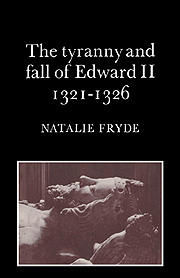Book contents
- Frontmatter
- Contents
- Preface
- Abbreviations
- 1 Problems and sources
- 2 Introduction: The king and the magnates before 1318
- 3 The rise of the Despensers
- 4 The civil war, 1321–2
- 5 The aftermath of the civil war: Imprisonments and executions
- 6 The aftermath of the civil war: Confiscations and the territorial settlement
- 7 Royal finance, 1321–6
- 8 The Despensers' spoils of power, 1321–6
- 9 The defeat in Scotland, 1322–3
- 10 The French war
- 11 The opposition to royal tyranny, 1322–6
- 12 London
- 13 Queen Isabella's invasion and the end of the regime
- 14 Edward II's deposition and ultimate fate
- 15 Epilogue: The regime of Mortimer and Isabella
- Appendix 1 Properties of the Despensers: Main facts and sources
- Appendix 2 The deposition of Edward II
- Notes
- Cited classes of records at the Public Record Office
- Sources
- Bibliography
- Index
6 - The aftermath of the civil war: Confiscations and the territorial settlement
Published online by Cambridge University Press: 09 October 2009
- Frontmatter
- Contents
- Preface
- Abbreviations
- 1 Problems and sources
- 2 Introduction: The king and the magnates before 1318
- 3 The rise of the Despensers
- 4 The civil war, 1321–2
- 5 The aftermath of the civil war: Imprisonments and executions
- 6 The aftermath of the civil war: Confiscations and the territorial settlement
- 7 Royal finance, 1321–6
- 8 The Despensers' spoils of power, 1321–6
- 9 The defeat in Scotland, 1322–3
- 10 The French war
- 11 The opposition to royal tyranny, 1322–6
- 12 London
- 13 Queen Isabella's invasion and the end of the regime
- 14 Edward II's deposition and ultimate fate
- 15 Epilogue: The regime of Mortimer and Isabella
- Appendix 1 Properties of the Despensers: Main facts and sources
- Appendix 2 The deposition of Edward II
- Notes
- Cited classes of records at the Public Record Office
- Sources
- Bibliography
- Index
Summary
The royal victory of 1322 meant a social dislocation and territorial revolution which has hitherto passed without much comment. Only detailed research into the landholding position county by county could bring its significance and long-term effects into sharp relief but the general picture of momentous upheaval is clear. It was accompanied by widespread plundering of Contrariants' property and a general breakdown of law and order. Riots and disturbances occurred which were apparently unconnected with the main civil war of 1321–2. A striking example was the attack by several hundred Cambridge towns-folk on the colleges some time shortly before May 1322. This was obviously the culmination of a good deal of town–gown troubles. A crowd led by the mayor himself ‘attacked and spoiled divers inns of the masters and scholars of the university, climbed the walls, broke the doors and windows, mounted by ladders into the solers and assaulted the said masters and scholars, imprisoned some, mutilated others and killed Walter de Shelton, parson of the church of Welton, carried away all they could of the books and other goods of the masters and scholars, so that no person dare to go to the University of the said town for study’. It is true that Edward II had called the universities of Oxford and Cambridge the ‘twin jewels in his crown’ and that he favoured the scholars of King's College, inviting them to spend Christmas with him, but these disturbances were probably not directed specifically against the king's protégés.
- Type
- Chapter
- Information
- The Tyranny and Fall of Edward II 1321–1326 , pp. 69 - 86Publisher: Cambridge University PressPrint publication year: 1979

